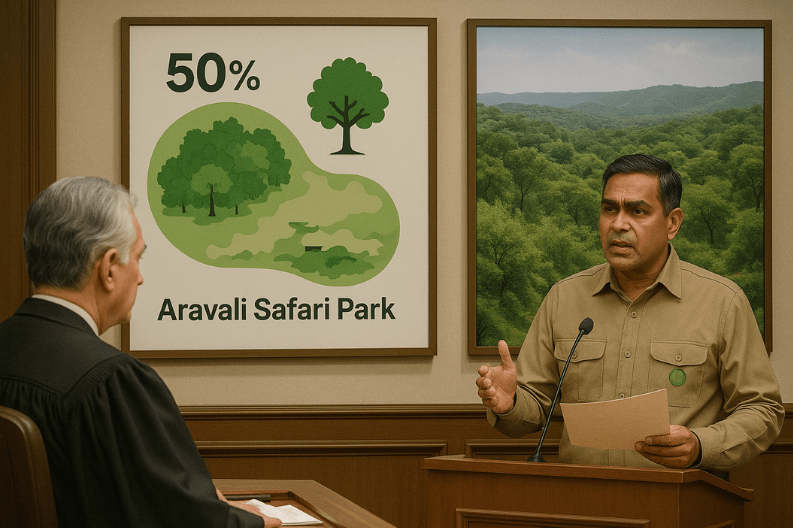In a recent update, Haryana shares plans for aravali safari park, telling the Supreme Court that only 5% of the area will be used for construction while nearly 70% will stay covered in natural greenery. 🌳 The state clarified that the goal of the project is not just tourism but eco-restoration and conservation. It aims to revive the local ecosystem and promote sustainable development in the Aravalli range.
The information came through an affidavit submitted on October 14 by Subhash Chander Yadav, the Chief Conservator of Forests (Wildlife). According to him, the safari park will focus on protecting biodiversity, improving groundwater recharge, and building pollution buffers for the National Capital Region (NCR).
The park will now cover 3,300 acres, much smaller than the original 10,000-acre proposal. It will extend through parts of Gurgaon and Nuh districts. Importantly, the state’s forest and wildlife department will manage the project alone, ensuring more accountability.
Yadav stated, “The project will be an ecological boon, not a disaster.” The government believes it will help bring back native plant species and offer livelihood opportunities through community-based eco-tourism. Local residents are expected to benefit from new jobs related to conservation and nature education.
Currently, the selected site is in poor condition. It has less than 40% tree cover, showing clear signs of degradation. The land is overrun with prosopis juliflora, an invasive plant species that harms local flora. In addition, earlier mining activities have left the soil dry and uneven.
The Supreme Court is examining this project under the long-running TN Godavarman Thirumulpad vs Union of India case, which monitors the protection of forests across India. During the hearing, five retired Indian Forest Service (IFS) officers, including Dr. R.P. Balwan, Dr. Uma Shanker Singh, Dr. Arvind Kumar Jha, Prakriti Srivastava, and Vinod Bhatia, filed a plea opposing the plan. They expressed concern that the project might disturb the ecological balance.
However, the Haryana government dismissed these objections as “based on outdated and selective information.” Officials argued that the retired officers lacked the legal authority to challenge the project. They also suggested that some objections appeared to seek publicity rather than genuine environmental protection.
The state’s affidavit explained that the safari park aligns with national goals such as the National Forest Policy of 1988 and the Mission LiFE initiative launched by Prime Minister Narendra Modi. It also supports the Aravalli Green Wall Project, which aims to increase forest cover across northern India.
Moreover, the plan highlights actions like planting indigenous trees, restoring soil health, creating biodiversity corridors, and improving water conservation. Authorities will allow controlled eco-tourism activities to ensure they cause minimal disturbance to wildlife. The government insists that this balance between conservation and tourism will make the park a model of responsible development.
Haryana officials also confirmed that the project follows all environmental laws. It meets the conditions of the Van (Sanrakshan Evam Samvardhan) Adhiniyam, 1980, and the Wildlife (Protection) Act, 1972. They referred to the new 2023 guidelines by the Ministry of Environment, Forest, and Climate Change, which allow safari parks on degraded lands if they aim for ecological restoration.
In its affidavit, the government clarified that the Aravali Safari Park does not overlap with compensation land from the Great Nicobar project. Letters sent in March, April, and August 2025 confirm that officials officially excluded the area from that plan.
Overall, this ambitious project seeks to transform barren land into a vibrant ecological zone. If implemented successfully, it could become a model for other states like Punjab and Rajasthan to follow. By prioritizing green recovery and community benefits, Haryana shares plans for aravali safari park, showing how conservation and development can work together for a sustainable future. 🌱



